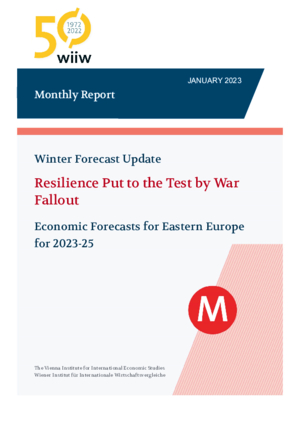Monthly Report No. 1/2023
Vasily Astrov, Alexandra Bykova, Rumen Dobrinsky, Selena Duraković, Richard Grieveson, Doris Hanzl-Weiss, Gabor Hunya, Branimir Jovanović, Niko Korpar, Sebastian Leitner, Isilda Mara, Olga Pindyuk, Sandor Richter, Bernd Christoph Ströhm, Marina Tverdostup, Nina Vujanović, Zuzana Zavarská and Adam Żurawski
wiiw Monthly Report No. 1, January 2023
44 pages including 4 Tables and 16 Figures
OVERVIEW 2021-2022 AND OUTLOOK 2023-2025
Premium Members only
Summary of key recent macroeconomic data for CESEE, and overview of new wiiw forecasts for 2023-2025 (Excel file)
Winter Forecast Update
Resilience Put to the Test by War Fallout
Economic Forecasts for Eastern Europe for 2023-25
Despite the war in Ukraine and the highest inflation for 15 years or more in many countries, the economies of Central, East and Southeast Europe (CESEE) are demonstrating their resilience. Russian President Vladimir Putin’s strategy of using energy as a weapon has failed, as most countries have already significantly reduced gas consumption. Although economic activity has slowed significantly, a full-year recession will be largely avoided in CESEE this year, except in Hungary – and Russia, whose economy will continue to decline (-3%), following the 2.5% contraction in 2022. After a 30% slump in GDP last year, Ukraine should recover somewhat this year (3%), although this forecast is subject to great uncertainty and depends, above all, on the future course of the war.
Overview by Richard Grieveson
Growth has slowed due to high inflation, but most economies are adapting, and the recovery will strengthen from the second half of 2023.
Country updates:
- Albania: Weaker though resilient growth expected by Isilda Mara
- Belarus: Decoupling from Europe leads to lasting economic weakness by Rumen Dobrinsky
- Bosnia and Herzegovina: One step closer to EU membership by Selena Duraković
- Bulgaria: Imbalances likely to stay as snap elections result in another split parliament by Rumen Dobrinsky
- Croatia: A new euro area member by Bernd Christoph Ströhm
- Czechia: Growth constrained by struggling domestic demand by Zuzana Zavarská
- Estonia: Combating the effects of the energy crisis by Maryna Tverdostup
- Hungary: Bleak short-term growth prospects by Sándor Richter
- Kazakhstan: Hopes for investment-driven growth by Alexandra Bykova
- Kosovo: Another difficult year ahead to meet energy needs by Isilda Mara
- Latvia: Rising confidence in the recession to be short-lived by Sebastian Leitner
- Lithuania: Resisting a war-induced recession by Sebastian Leitner
- Moldova: Emerging from the energy crisis? by Gábor Hunya
- Montenegro: Growing, despite instability by Nina Vujanović
- North Macedonia: FDI lifting the economy? by Branimir Jovanović
- Poland: A slowdown in the making by Adam Żurawski
- Romania: Deceleration despite an engine change by Gábor Hunya
- Russia: Energy exports crippled by sanctions by Vasily Astrov
- Serbia: The price of close relations with Russia by Branimir Jovanović
- Slovakia: Outlook threatened by political turmoil by Doris Hanzl-Weiss
- Slovenia: Despite subdued prospects, still ahead of the EU average by Niko Korpar
- Turkey: Foot to the floor as election approaches by Richard Grieveson
- Ukraine: Defying Russia’s bombs by Olga Pindyuk
Reference to wiiw databases: wiiw Annual Database, wiiw Monthly Database, wiiw FDI Database
Keywords: Keywords: CESEE, economic forecast, Central and Eastern Europe, Western Balkans, EU, euro area, CIS, war in Ukraine, Ukrainian refugees, energy dependence, EU accession, COVID-19, EU Recovery and Resilience Facility, economic growth, labour markets, inflation, stagflation, monetary policy, fiscal policy
JEL classification: E20, E21, E22, E23, E24, E31, E32, E5, E62, F21, F31, H60, I18, J20, J30, O47, O52, O57, P24, P27, P33, P52
Countries covered: Albania, Belarus, Bosnia and Herzegovina, Bulgaria, CESEE, CIS, Croatia, Czechia, Estonia, EU-CEE, European Union, Hungary, Kazakhstan, Kosovo, Latvia, Lithuania, Moldova, Montenegro, New EU Member States, North Macedonia, Poland, Romania, Russia, SEE, Serbia, Slovakia, Slovenia, Turkey, Ukraine
Research Areas: Macroeconomic Analysis and Policy
